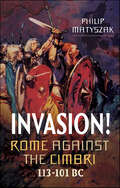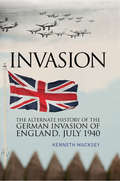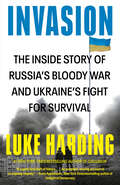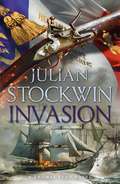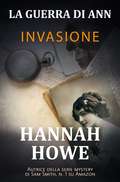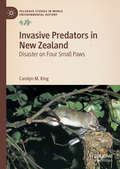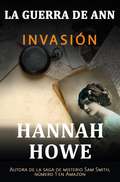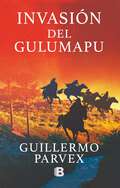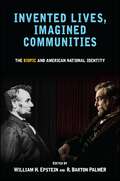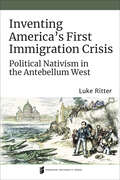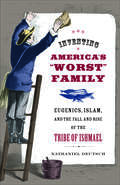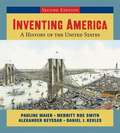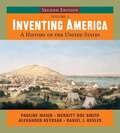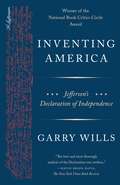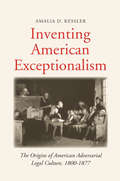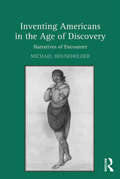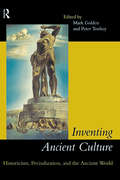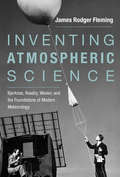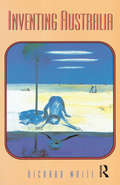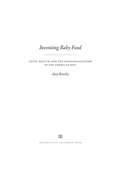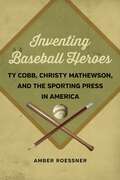- Table View
- List View
Invasion!: Rome Against the Cimbri, 113–101 BC
by Philip MatyszakPartly as a result of poor commanders and partly because the Romans had an innate and misguided belief in the invincibility of their legions, the first battles against the Cimbri were a series of disasters. These culminated in the Battle of Arausio in 105 BC when two Roman armies were utterly destroyed. Rome finally realized that their republic faced an existential threat, and made the necessary painful political and military changes that were needed to face that threat. Rome also found a commander who could take on the Cimbri. Caius Marius was a deeply flawed man – scheming, cautious to the point of cowardice, and quick to claim credit for the achievements of others. Nevertheless, he was a massive improvement on the leaders who had preceded him. The reshaped Roman army eventually worked out how to weather the savage onrush of the initial barbarian assault. Thereafter, the grim discipline of the legions was enough to wear down the opposition. It helped that Marius never fought unless the situation favored him, and as a result his army gradually became accustomed to victory. Had the Cimbri overwhelmed Rome, as at one time it seemed inevitable that they would, then European history would have been very different.
Invasion: The Alternative History of the German Invasion of England, July 1940 (Greenhill Military Paperback Ser.)
by Kenneth MackseyThe WWII historian&’s bracingly accurate analysis of what might have happened if Hitler ordered Operation Sea Lion to breech the shores of England. In June 1940, German troops gathered just across the English Channel, poised for the invasion of Britain. With France defeated and Britain cowed, Hitler seemed ready for his greatest gamble. In this compelling alternative history, the Germans launch the invasion that, in reality, was never more than a plan. Landing between Dover and Hythe, German troops push inland supported by the Luftwaffe and the impregnable panzers, and strike out towards London. The British, desperate to defeat the invaders, rally and prepare for a crucial confrontation at Maidstone. Realistic, carefully researched and superbly written, Invasion is a classic of alternate history and a thought-provoking look at how Britain&’s war might have been.&“Macksey&’s blend of what actually happened and what might have been makes for a piece of writing comparable to Frederick Forsyth at his best.&” —Jack Higgins&“Convincingly described and excellently illustrated.&” —The Daily Telegraph, UK
Invasion: The Inside Story of Russia's Bloody War and Ukraine's Fight for Survival
by Luke HardingNew York Times bestselling author of Collusion and The Snowden Files Luke Harding&’s personal, frontline reporting on Russia&’s harrowing invasion of Ukraine, the biggest news event of the year and an inflection point in international politics&“An excellent, moving account of an ongoing tragedy.&” —Anne Applebaum, New York Times bestselling author of Twilight of DemocracyIn a damning, inspiring, and breathtaking narrative of what is likely to be a turning point for Europe—and the world—Guardian correspondent and New York Times bestselling author Luke Harding reports firsthand on the Russian invasion of Ukraine. When, just before dawn on February 24, 2022, Vladimir Putin launched a series of brutal attacks, Harding was there, on the ground in Kyiv. But this senseless violence was met with astounding resilience—from, among others, the country&’s embattled president, Volodymyr Zelenskiy—and the courage of a people preparedi to risk everything to preserve their nation&’s freedom. Here are piercing portraits of the leaders on both sides of this monumental struggle, a haunting depiction of the atrocities in Bucha and elsewhere, and an intimate glimpse into the ordinary lives being impacted by the biggest conflict in Europe since the Second World War. Harding captures this crucial moment in history with candor, insight, and an unwavering focus on the human stories that lie at its heart.
Invasion: Thomas Kydd 10
by Julian Stockwin'Paints a vivid picture of life aboard the mighty ship-of-the-line' - Daily ExpressNapoleon's forces are poised to invade Britain, and Commander Thomas Kydd's ship is at the forefront of the fleet defending the English coast. His honour restored after temporary disgrace in the Channel Islands, and reunited with his ship Teazer, Kydd seizes the chance to fight for his country. Then Kydd is abruptly withdrawn from the fleet and sent back to Dover on a secret mission to guard a mysterious American inventor. Having worked his way up from press-ganged seaman to captain of his own ship, Kydd is furious to find he will miss his opportunity to prove himself in battle. And Kydd's baffled superiors are equally angry to lose Kydd and his ship at such a dangerous time. Yet Kydd's role in the approaching war may be the most crucial part he has ever played.*********************What readers are saying about INVASION'Excellent in all respects' - 5 stars'Very compelling reading!' - 5 stars'I read ALL of the books by Julian Stockwin, he is an amazing author' - 5 stars'Yet another top-notch tale from the grand master of the age of fighting sail' - 5 stars'Julian Stockwin knows his craft . . . I lose myself in his books' - 5 stars
Invasion: Thomas Kydd 10
by Julian Stockwin'Paints a vivid picture of life aboard the mighty ship-of-the-line' - Daily ExpressNapoleon's forces are poised to invade Britain, and Commander Thomas Kydd's ship is at the forefront of the fleet defending the English coast. His honour restored after temporary disgrace in the Channel Islands, and reunited with his ship Teazer, Kydd seizes the chance to fight for his country. Then Kydd is abruptly withdrawn from the fleet and sent back to Dover on a secret mission to guard a mysterious American inventor. Having worked his way up from press-ganged seaman to captain of his own ship, Kydd is furious to find he will miss his opportunity to prove himself in battle. And Kydd's baffled superiors are equally angry to lose Kydd and his ship at such a dangerous time. Yet Kydd's role in the approaching war may be the most crucial part he has ever played.*********************What readers are saying about INVASION'Excellent in all respects' - 5 stars'Very compelling reading!' - 5 stars'I read ALL of the books by Julian Stockwin, he is an amazing author' - 5 stars'Yet another top-notch tale from the grand master of the age of fighting sail' - 5 stars'Julian Stockwin knows his craft . . . I lose myself in his books' - 5 stars
Invasione
by Maria Cristina Martinelli Hannah HoweMentre suo marito Emrys viene ancora dato per disperso in azione, Ann Morgan riceve un’offerta personale dall’affabile Ispettore Max Deveraux. Dovrebbe declinare o accettare la sua offerta? Invece, nella sua vita professionale, Ann si trova davanti a un dilemma. Dopo l’omicidio di Trevor Bowman, dovrebbe rilevare la sua agenzia investigativa? Proprio quando Ann sta riflettendo sugli aspetti personali e professionali della propria vita, un’amica le chiede di cercare sua figlia che è scomparsa. All’apparenza, Adeline Hopkins, la figlia, sta soffrendo per la relazione conflittuale che ha con il proprio padre. Però, che dire del suo ex-fidanzato e di un soldato americano, un Marine che ha frequentato brevemente? Con i soldati che si preparano per partire ed imbarcarsi per la seconda ondata del D-Day, Ann ha bisogno di risposte e finisce invece per trovarsi di nuovo di fronte a un altro quesito, il dilemma su come fare giustizia al meglio.
Invasive Predators in New Zealand: Disaster on Four Small Paws (Palgrave Studies in World Environmental History)
by Carolyn M. KingThe story of invasive species in New Zealand is unlike any other in the world. By the mid-thirteenth century, the main islands of the country were the last large landmasses on Earth to remain uninhabited by humans, or any other land mammals. New Zealand’s endemic fauna evolved in isolation until first Polynesians, and then Europeans, arrived with a host of companion animals such as rats and cats in tow. Well-equipped with teeth and claws, these small furry mammals, along with the later arrival of stoats and ferrets, have devastated the fragile populations of unique birds, lizards and insects. Carolyn M. King brings together the necessary historical analysis and recent ecological research to understand this long, slow tragedy. As a comprehensive historical perspective on the fate of an iconic endemic fauna, this book offers much-needed insight into one of New Zealand’s longest-running national crises.
Invasión
by Hannah HoweLa saga de misterio La Guerra de Ann es una saga de cinco novelas ambientadas en los años 1944/1945. Las historias son Betrayal, Invasion, Blackmail, Escape y Victory (títulos originales), cada una con aproximadamente 15 000 palabras. Estas se desarrollan cada cuatro meses y se publicarán cada cuatro meses, de forma que se puedan leer en tiempo real. Sin embargo, es posible que prefiera leerlas todas a la vez después de que se publique Victory. Es cuestión de gustos. Cabe mencionar que, en cada libro, hay un misterio que queda resuelto y que la historia de Ann alcanzará su conclusión tras la última publicación. Invasión Aún con su marido desaparecido, Ann Morgan recibe una oferta personal del apuesto detective Max Deveraux. ¿Debería declinarla o aceptarla? Mientras tanto, su vida profesional se ve afectada por un dilema: tras el asesinato de Trevor Bowman, ¿debería tomar las riendas de su agencia de investigación? Mientras Ann sopesa todos los aspectos de su vida personal y profesional, una amiga le pide que busque a su hija desaparecida. Parece que Adeline Hopkins, la hija, mantiene una mala relación con su padre. Sin embargo, ¿qué tienen que ver su exnovio y un soldado estadounidense con el que la joven estuvo saliendo brevemente? Mientras el ejército estadounidense se prepara para marcharse rumbo a la segunda ola de desembarcos, Ann necesita respuestas, las cuales la llevarán hasta un segundo dilema: ¿cuál es la mejor manera de impartir justicia?
Invasión del Gulumapu
by Guillermo ParvexContinuación de la novela en la que el periodista y escritor de no ficción se adentra en el imaginario mapuche a través del peñi Pedro Bórquez. Pedro Bórquez ha armado familia y una vida en el Gulumapu. Con esposa, hijos y buen vivir, el chileno que se adentró en tierras mapuche luego del terremoto que dejó Concepción en el suelo es el brazo derecho del lonko Mañilwenu, y junto a él consultará el cherrufe, la piedra mágica que le permite avizorar el futuro de su pueblo y el peligro que esas tierras corren por la amenaza de los chilenos. Segunda entrega de la exitosa ficción sobre el mundo mapuche que Guillermo Parvex inició con Frontera Sur y que, como lo hizo también en la ficción, cuenta con una fundamentación histórica que hace de esta novela un fiel retrato de los hechos que constituyeron a Chile como nación mestiza.
Inveighing We Will Go
by William F. Buckley Jr.Another collection of writing from William F. Buckley Jr., discussing such varied issues as the economy, religion, politics, education and communication.
Invented Lives, Imagined Communities: The Biopic and American National Identity (SUNY series, Horizons of Cinema)
by William H. Epstein; R. Barton PalmerBiopics—films that chronicle the lives of famous and notorious figures from our national history—have long been one of Hollywood's most popular and important genres, offering viewers various understandings of American national identity. Invented Lives, Imagined Communities provides the first full-length examination of US biopics, focusing on key releases in American cinema while treating recent developments in three fields: cinema studies, particularly the history of Hollywood; national identity studies dealing with the American experience; and scholarship devoted to modernity and postmodernity. Films discussed include Houdini, Patton, The Great White Hope, Bound for Glory, Ed Wood, Basquiat, Pollock, Sylvia, Kinsey, Fur, Milk, J. Edgar, and Lincoln, and the book pays special attention to the crucial generic plot along which biopics traverse and showcase American lives, even as they modify the various notions of the national character.
Invented by Law: Alexander Graham Bell and the Patent That Changed America
by Christopher BeauchampChristopher Beauchamp debunks the myth of Alexander Graham Bell as the telephone's sole inventor, exposing that story's origins in the arguments advanced by Bell's lawyers during fiercely contested battles for patent monopoly. The courts anointed Bell father of the telephone--likely the most consequential intellectual property right ever granted.
Inventing America's First Immigration Crisis: Political Nativism in the Antebellum West (Catholic Practice in North America)
by Luke RitterWhy have Americans expressed concern about immigration at some times but not at others? In pursuit of an answer, this book examines America’s first nativist movement, which responded to the rapid influx of 4.2 million immigrants between 1840 and 1860 and culminated in the dramatic rise of the National American Party. As previous studies have focused on the coasts, historians have not yet completely explained why westerners joined the ranks of the National American, or “Know Nothing,” Party or why the nation’s bloodiest anti-immigrant riots erupted in western cities—namely Chicago, Cincinnati, Louisville, and St. Louis. In focusing on the antebellum West, Inventing America’s First Immigration Crisis illuminates the cultural, economic, and political issues that originally motivated American nativism and explains how it ultimately shaped the political relationship between church and state.In six detailed chapters, Ritter explains how unprecedented immigration from Europe and rapid westward expansion reignited fears of Catholicism as a corrosive force. He presents new research on the inner sanctums of the secretive Order of Know-Nothings and provides original data on immigration, crime, and poverty in the urban West. Ritter argues that the country’s first bout of political nativism actually renewed Americans’ commitment to church-state separation. Native-born Americans compelled Catholics and immigrants, who might have otherwise shared an affinity for monarchism, to accept American-style democracy. Catholics and immigrants forced Americans to adopt a more inclusive definition of religious freedom. This study offers valuable insight into the history of nativism in U.S. politics and sheds light on present-day concerns about immigration, particularly the role of anti-Islamic appeals in recent elections.
Inventing America's Worst Family: Eugenics, Islam, and the Fall and Rise of the Tribe of Ishmael
by Nathaniel DeutschThis book tells the stranger-than-fiction story of how a poor white family from Indiana was scapegoated into prominence as America's "worst" family by the eugenics movement in the early twentieth century, then "reinvented" in the 1970s as part of a vanguard of social rebellion. In what becomes a profoundly unsettling counter-history of the United States, Nathaniel Deutsch traces how the Ishmaels, whose patriarch fought in the Revolutionary War, were discovered in the slums of Indianapolis in the 1870s and became a symbol for all that was wrong with the urban poor. The Ishmaels, actually white Christians, were later celebrated in the 1970s as the founders of the country's first African American Muslim community. This bizarre and fascinating saga reveals how class, race, religion, and science have shaped the nation's history and myths.
Inventing America: A History of the United States
by Pauline Maier Merritt Roe Smith Alexander Keyssar Daniel J. KevlesW. W. Norton presents Inventing America, a balanced new survey of American history by four outstanding historians. The text uses the theme of innovation—the impulse in American history to "make it new"—to integrate the political, economic, social, and cultural dimensions of the American story. From the creation of a new nation and the invention of the corporation in the eighteenth century, through the vast changes wrought by early industry and the rise of cities in the nineteenth century, to the culture of jazz and the new nation-state of the twentieth century, the text draws together the many ways in which innovation—and its limits—have marked American history.
Inventing America: A History of the United States, Volume 1 (2nd Edition)
by Pauline Maier Merritt Roe Smith Alexander Keyssar Daniel J. KevlesA textbook that includes study plans, outline quizzes, research projects and progress reports
Inventing America: Jefferson's Declaration of Independence
by Garry WillsFrom one of America's foremost historians, Inventing America compares Thomas Jefferson's original draft of the Declaration of Independence with the final, accepted version, thereby challenging many long-cherished assumptions about both the man and the document. Although Jefferson has long been idealized as a champion of individual rights, Wills argues that in fact his vision was one in which interdependence, not self-interest, lay at the foundation of society. "No one has offered so drastic a revision or so close or convincing an analysis as Wills has . . . The results are little short of astonishing" —(Edmund S. Morgan, New York Review of Books)
Inventing American Exceptionalism: The Origins of American Adversarial Legal Culture, 1800-1877
by Amalia D. KesslerA highly engaging account of the developments--not only legal, but also socioeconomic, political, and cultural--that gave rise to Americans' distinctively lawyer-driven legal culture When Americans imagine their legal system, it is the adversarial trial--dominated by dueling larger-than-life lawyers undertaking grand public performances--that first comes to mind. But as award-winning author Amalia Kessler reveals in this engrossing history, it was only in the turbulent decades before the Civil War that adversarialism became a defining American practice and ideology, displacing alternative, more judge-driven approaches to procedure. By drawing on a broad range of methods and sources--and by recovering neglected influences (including from Europe)--the author shows how the emergence of the American adversarial legal culture was a product not only of developments internal to law, but also of wider socioeconomic, political, and cultural debates over whether and how to undertake market regulation and pursue racial equality. As a result, adversarialism came to play a key role in defining American legal institutions and practices, as well as national identity.
Inventing Americans in the Age of Discovery: Narratives of Encounter
by Michael HouseholderInventing Americans in the Age of Discovery traces the linguistic, rhetorical, and literary innovations that emerged out of the first encounters between Europeans and indigenous peoples of the Americas. Through analysis of six texts, Michael Householder demonstrates the role of language in forming the identities or characters that permitted Europeans (English speakers, primarily) to adapt to the unusual circumstances of encounter. Arranged chronologically, the texts examined include John Mandeville's Travels, Richard Eden's English-language translations of the accounts of Spanish and Portuguese discovery and conquest, George Best's account of Martin Frobisher's voyages to northern Canada, Ralph Lane's account of the abandonment of Roanoke, John Smith's writings about Virginia, and John Underhill's account of the Pequot War. Through his analysis, Householder reveals that English colonists did not share a universal, homogenous view of indigenous Americans as savages, but that the writers, confronted by unfamiliar peoples and situations, resorted to a mixed array of cultural beliefs, myths, and theories to put together workable explanations of their experiences, which then became the basis for how Europeans in the colonies began transforming themselves into Americans.
Inventing Ancient Culture: Historicism, periodization and the ancient world
by Golden Mark Toohey PeterInventing Ancient Culture discusses aspects of antiquity which we have tended to ignore. It asks the reader how far we have reinvented antiquity, by applying modern concepts and understandings to its study. Furthermore, it challenges the common notion that perceptions of the self, of modern societal and institutional structures, originated in the Enlightenment. Rather, the authors and contributors argue, there are many continuities and marked similarities between the classical and the modern world. Mark Golden and Peter Toohey have assembled a lively cast of contributors who analyse and argue about classical culture, its understandings of philosophy, friendship, the human body, sexuality and historiography
Inventing Atlantic Canada
by Corey SlumkoskiWhen Newfoundland entered the Canadian Confederation in 1949, it was hoped it would promote greater unity between the Maritime provinces, as Term 29 of the Newfoundland Act explicitly linked the region's economic and political fortunes. On the surface, the union seemed like an unprecedented opportunity to resurrect the regional spirit of the Maritime Rights movement of the 1920s, which advocated a cooperative approach to addressing regional underdevelopment. However, Newfoundland's arrival did little at first to bring about a comprehensive Atlantic Canadian regionalism.Inventing Atlantic Canada is the first book to analyse the reaction of the Maritime provinces to Newfoundland's entry into Confederation. Drawing on editorials, government documents, and political papers, Corey Slumkoski examines how each Maritime province used the addition of a new provincial cousin to fight underdevelopment. Slumkoski also details the rise of regional cooperation characterized by the Atlantic Revolution of the mid-1950s, when Maritime leaders began to realize that by acting in isolation their situations would only worsen.
Inventing Atmospheric Science: Bjerknes, Rossby, Wexler, and the Foundations of Modern Meteorology
by James Rodger FlemingHow scientists used transformative new technologies to understand the complexities of weather and the atmosphere, told through the intertwined careers of three key figures.“The goal of meteorology is to portray everything atmospheric, everywhere, always,” declared John Bellamy and Harry Wexler in 1960, soon after the successful launch of TIROS 1, the first weather satellite. Throughout the twentieth century, meteorological researchers have had global ambitions, incorporating technological advances into their scientific study as they worked to link theory with practice. Wireless telegraphy, radio, aviation, nuclear tracers, rockets, digital computers, and Earth-orbiting satellites opened up entirely new research horizons for meteorologists. In this book, James Fleming charts the emergence of the interdisciplinary field of atmospheric science through the lives and careers of three key figures: Vilhelm Bjerknes (1862–1951), Carl-Gustaf Rossby (1898–1957), and Harry Wexler (1911–1962).In the early twentieth century, Bjerknes worked to put meteorology on solid observational and theoretical foundations. His younger colleague, the innovative and influential Rossby, built the first graduate program in meteorology (at MIT), trained aviation cadets during World War II, and was a pioneer in numerical weather prediction and atmospheric chemistry. Wexler, one of Rossby's best students, became head of research at the U.S. Weather Bureau, where he developed new technologies from radar and rockets to computers and satellites, conducted research on the Antarctic ice sheet, and established carbon dioxide measurements at the Mauna Loa Observatory in Hawaii. He was also the first meteorologist to fly into a hurricane—an experience he chose never to repeat.Fleming maps both the ambitions of an evolving field and the constraints that checked them—war, bureaucracy, economic downturns, and, most important, the ultimate realization (prompted by the formulation of chaos theory in the 1960s by Edward Lorenz) that perfectly accurate measurements and forecasts would never be possible.
Inventing Australia: Images And Identity, 1688-1980 (Australian Experience Ser. #No. 3)
by Richard White'White sets himself a most ambitious task, and he goes remarkably far to achieving his goals. Very few books tell so much about Australia, with elegance and concision, as does his' - Professor Michael Roe'Stimulating and informative. an antidote to the cultural cringe' - Canberra Times'To be Australian': what can that mean? Inventing Australia sets out to find the answers by tracing the images we have used to describe our land and our people - the convict hell, the workingman's paradise, the Bush legend, the 'typical' Australian from the shearer to the Bondi lifesaver, the land of opportunity, the small rich industrial country, the multicultural society.The book argues that these images, rather than describing an especially Australian reality, grow out of assumptions about nature, race, class, democracy, sex and empire, and are 'invented' to serve the interests of particular groups.There have been many books about Australia's national identity; this is the first to place the discussion within an historical context to explain how Australians' views of themselves change and why these views change in the way they do.
Inventing Baby Food
by Amy BentleyFood consumption is a significant and complex social activity--and what a society chooses to feed its children reveals much about its tastes and ideas regarding health. In this groundbreaking historical work, Amy Bentley explores how the invention of commercial baby food shaped American notions of infancy and influenced the evolution of parental and pediatric care. Until the late nineteenth century, infants were almost exclusively fed breast milk. But over the course of a few short decades, Americans began feeding their babies formula and solid foods, frequently as early as a few weeks after birth. By the 1950s, commercial baby food had become emblematic of all things modern in postwar America. Little jars of baby food were thought to resolve a multitude of problems in the domestic sphere: they reduced parental anxieties about nutrition and health; they made caretakers feel empowered; and they offered women entering the workforce an irresistible convenience. But these baby food products laden with sugar, salt, and starch also became a gateway to the industrialized diet that blossomed during this period. Today, baby food continues to be shaped by medical, commercial, and parenting trends. Baby food producers now contend with health and nutrition problems as well as the rise of alternative food movements. All of this matters because, as the author suggests, it's during infancy that American palates become acclimated to tastes and textures, including those of highly processed, minimally nutritious, and calorie-dense industrial food products.
Inventing Baseball Heroes: Ty Cobb, Christy Mathewson, and the Sporting Press in America
by Amber RoessnerIn Inventing Baseball Heroes, Amber Roessner examines "herocrafting" in sports journalism through an incisive analysis of the work surrounding two of baseball's most enduring personalities -- Detroit Tigers outfielder Ty Cobb and New York Giants pitcher Christy Mathewson. While other scholars have demonstrated that the mythmakers of the Golden Age of Sports Writing (1920--1930) manufactured heroes out of baseball players for the mainstream media, Roessner probes further, with a penetrating look at how sportswriters compromised emerging professional standards of journalism as they crafted heroic tales that sought to teach American boys how to be successful players in the game of life.Cobb and Mathewson, respectively stereotyped as the game's sinner and saint, helped shape their public images in the mainstream press through their relationship with four of the most prominent sports journalists of the time: Grantland Rice, F. C. Lane, Ring Lardner, and John N. Wheeler. Roessner traces the interactions between the athletes and the reporters, delving into newsgathering strategies as well as rapport-building techniques, and ultimately revealing an inherent tension in objective sports reporting in the era. Inventing Baseball Heroes will be of interest to scholars of American history, sports history, cultural studies, and communication. Its interdisciplinary approach provides a broad understanding of the role sports journalists played in the production of American heroes.
